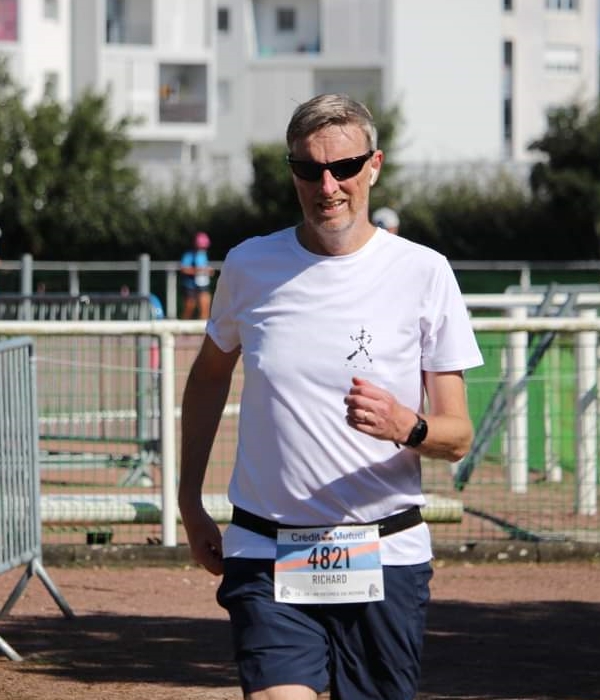 My last race of 2024 was a second visit to Royan, France for their annual 48 hour race for which they have a category for walkers as well as runners.
My last race of 2024 was a second visit to Royan, France for their annual 48 hour race for which they have a category for walkers as well as runners.
I won the race in 2018 and although I absolutely hated the course that year, the opportunity to test myself over two days again, and hopefully make amends for my disappointing DNF in the Gloucester 48 hour race last year and my sub-par performance at the Athens 48 hour race in 2020 (my only other two 48 hour races) was too much to keep me away.
I had also walked within a eight kilometres of my 2018 PB during the first 48 hours of both this year and last year’s six day races, so I felt confident that I could easily beat my 278km PB from Royan 2018 and my main reason for wanting to race over 48 hours was to prove to myself that I could have a strong second day, which has always been my worst day in any race longer than 24 hour.
So my goal was to walk a steady pace for the first 24 to 25 hours, have a short sleep, then walk a strong second day. I thought 300km was a strong possibility.
Getting there:
To be honest, while the above all sounds positive, I was lacking a little confidence in the lead-up to the race and had a few regrets about entering the race. It was a good idea at the time but not so much now.
When I dropped out of the Gloucester 48 hour race last year I said to myself that I wouldn’t have dropped out if I had a support crew, because I would be letting them down. So I asked Sarah Lightman, support crew extraordinaire (see my last three six-day race reports) to come as my support person, and Kathy Crilley decided to come with us (and compete in the 12 hour race).
This meant that I couldn’t back out now, and we all met up at Stansted airport late morning on the Wednesday before the Friday race start for what would end up being two flights to France.
We have decided over the years that with all the various airport and rail strikes that France has become well-known for, we will always travel at least one day early, just in case something goes wrong, and it was looking like this strategy was going to prove right today.
Our flight took off on time at 1pm and all was going well until 45 minutes into a 90 minute flight the pilot announced that due to ‘operational issues’ we would be returning to Stansted. So at the exact time that we should have been landing in La Rochelle (70km north of Royan) we landed back at Stansted airport, London!
Not a good start.
We then sat on the plane for an hour waiting to learn whether we would be flying again or off-boarding. Secretly, I was thinking, “I’m not going to have to do the race after all”, but after an hour the plane was refuelled and we flew to France for the second time. This time we landed at our destination airport, collected our rental car and drove to our AirBnB which was located just 300 metres from the stadium hosting the race.
Nutrition:
The following day we found the local supermarket to buy some supplies – I had taken plenty of Carbohydrate sports drink powder and chews but we needed some additional food for the race and also for eating at the AirBnB. After the groceries were done, we spent the rest of the day resting before going to the stadium to register for the race late afternoon.
One of the reasons we have started staying at AirBnB’s before races, rather than hotels, is that we can cook our own meals and eat good quality food in sufficient quantities in the leadup to the race instead of being reliant on restaurant food, and for this race I was attempting to consume 600 grams of carbohydrate in both the two days before the race. Cooking your own food makes it easier to calculate the calorie and carb content than eating restaurant prepared meals, and also enabled me to focus on eating only foods with a high carbohydrate concentration.
In the past I have tried to eat plenty of carbs in the two days before a race, but this time I was recording everything I ate and making sure I consumed enough carbs.
I also had a nutrition plan for the race for only the second time ever – the recent Gloucester 24 hour race being the first. Similar to Gloucester, I intended to consume 25 grams of carbs (about 100 calories) every 20 minutes, alternating between sports drinks and chews. I thought I would be able to eat like this for the first 24 hours and then transition to real foods after my planned sleep at 25 hours.
I also had some Coke and a few odds and ends in case I needed something else, and Sarah was going to be coming and going during the first day and would then spend the majority of the second day at the track if I needed her – meaning that she would be able to get whatever additional food I needed.
The track:
The race course is a 1,127 metres per ‘lap’ that is 90% on a 400 metre athletics track (three quarters of a lap in lane one, a 180 degree turn and back to near the start in the middle lane, another 180 degree turn, and back along the outside of the track) with a small section outside the track through a long marquee which contain the timing equipment plus athlete’s individual food tables and the aid station where volunteers maintain a continual supply of food and drink throughout the race.
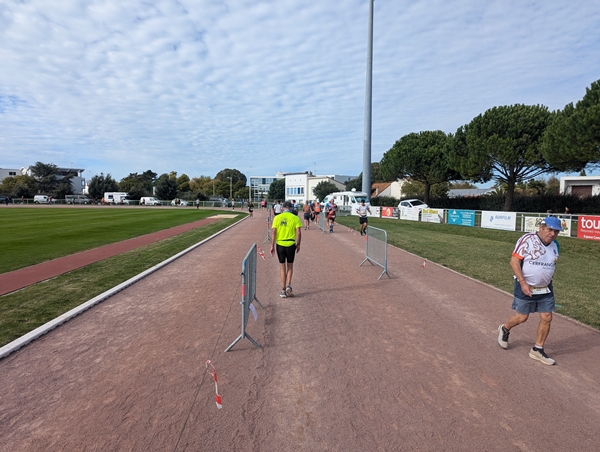
The track surface is not the usual synthetic rubber surface that most athletic tracks have these days. Instead, just like Privas, the track has a cinder/ash/grit surface comprising of very small stones that can kill your feet if they get in your shoes. Reading my race reports from Privas 2015 (72 hours), 2016, 17 and 18 (all six days) plus Royan 2018 and in all those races I had major problems with blisters caused by the grit getting in my shoes.
Well, after 23 days of walking around those tracks I finally came up with the answer, and as well as wearing gaiters I taped up my shoes so that there was no way any grit would get in.
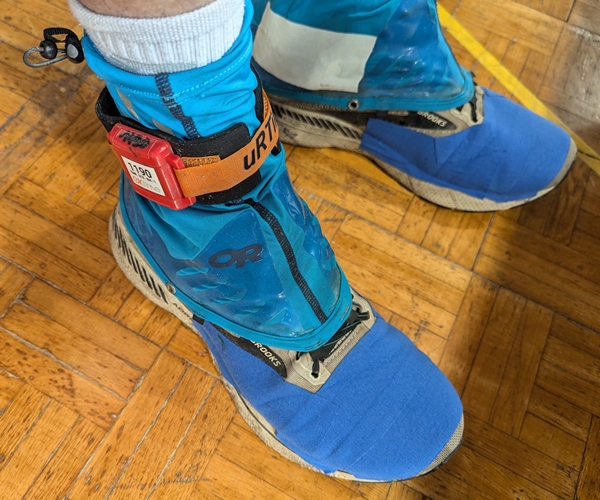
This worked 100%. I did get a couple small blisters but nothing more than I would get in any other 48 hour race. I wish I had come up with this idea after my first time at Privas in 2016. It was have saved me many hours of in-race blister treatment/repairs and saved me from a lot of pain in my three six day races on that horrible track.
The race:
The night before the race I had my best ever pre-race sleep – 10 hours! I woke up at 7am, three hours before race start, thinking that I have absolutely no excuses now after such a great night’s sleep. I had my usual breakfast – two plates of porridge plus yoghurt – and added a banana and clementine plus 100 grams of carb drink between breakfast and race start.
We headed over to the stadium around 8’ish for final preparations after which I then lay down in my camp stretcher, which I would be sleeping on the following day, to rest until race start.
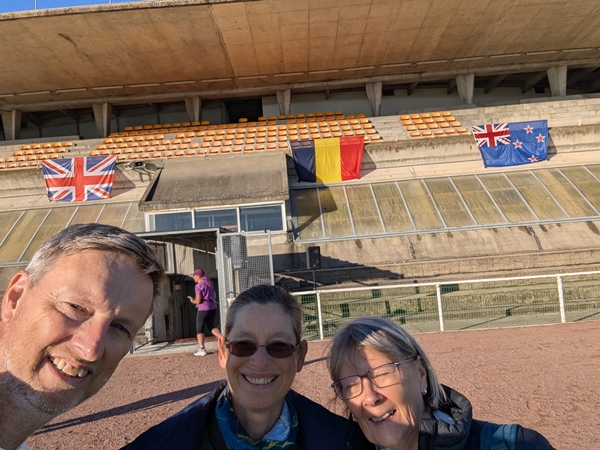
The weather forecast was good for day one, but rain was forecast for the last 15-20 hours, although fortunately it wasn’t expected to be as bad as 2018 when we had summer for the first 24 hours and winter with rain and strong wind for the second day. I was prepared for whatever weather we had, with two jackets, a poncho, plus waterproof socks if needed.
This year there were 21 walkers and 30 runners entered in the 48 hour race plus similar numbers in the 12 and 24 hour races starting the following day. Plenty of other people to interact with over the two days, and with the layout of the course there would never be any boring periods with no one else nearby.
Looking at the field, there were a few walkers I didn’t know, but I was confident that I would win the race if I could walk 280km plus. Alain Malfondet was probably my main competitor but when we last met at Vallon where I raced 6 days and he competed in the 48 hour race, my 48 hour split was 15+ km ahead of him, so I was confident I could beat Alain. I was also confident that I would beat all the other walkers whose names I recognised.
I started the race comfortably, aiming for around 8 to 8 ½ minutes per kilometre during the first few hours – with the lap being 1.127km, my aim was 9 to 9 ½ minutes per lap.
The lap distance meant that every nine laps was just over ten kilometres and I passed the first 10km in 1 hour 24 minutes, an average lap time of 9:21, so bang on target. I was in 7th place for all of that first 10km but I was feeling comfortable and I was in no rush to take the lead. I figured that I would start moving up the field during the evening and would probably take the lead sometime overnight, but even if I didn’t, I just needed to be in contention after day one so that after a short sleep I could ‘race’ day two.
I felt good, even great, through the first ten hours, and even commented to Kathy or Sarah at one stage that although I hated the course back in 2018, I was “really enjoying” the race.
I wasn’t focused on my place at all, but I did occasionally check the results online via my phone as I walked and at three hours I was slightly over half marathon distance and in 4th place. The race results TV screen was so close to the timing mat that by the time our lap times appeared on screen, we had already walked passed the monitor, so unless I wanted to stop periodically, it was easier to monitor the race results via my phone.
Looking at the race results while writing this report I see that I didn’t move up to third place until just after 9 ½ hours (69km) and in all that time I had continued to maintain a steady average pace of 9:22 per lap, and this included six short stops (three wee stops and three short stops for other reasons) totalling three minutes. Things were going well.
I was 23 minutes behind Alain with Olivier Parazot (someone I didn’t know) in between us, about 6 minutes behind Alain. But I wasn’t focussed on racing yet, just trying to maintain a steady pace, especially with darkness approaching and my knowledge that I always slow down when it gets dark, even with the floodlights that would turn on shortly.
I reached 86km in 12 hours, and was still holding a good pace, only slowing slightly when it got dark. I had maintained a 9:30 average lap pace for the pervious two hours and was now in second place, two laps (19 minutes) behind Alain and 30 minutes in front of Olivier in 3rd. Olivier had taken a break earlier but was still looking good.
I had surprised myself. Normally, when it gets dark, it’s like a switch and I immediately slow by 30 seconds per kilometre, but not today. I was still fuelling every 20 minutes and was feeling mentally and physically strong, and was gaining confidence seeing each lap time being pretty much the same that I had maintained all day. Maybe my nutrition plan was working for me.
I reached 100km in 13 hours 55 minutes, still in 2nd place but now only ¾’s of a lap behind Alain. More importantly, I was still maintaining a great pace, and was actually walking faster than at any time during the race to date, dipping down below 9:10 on some laps. I was feeling great!
And then just before 15 hours (3am) I passed Alain and thought to myself that that was the race. I would build up a lead over the next 7 or 8 hours before having my planned one hour sleep, and would then just push on for the win. And based on my current pace, a distance well in excess of my PB and probably over 300km was looking very possible.
Falling apart:
The switch turned on or off (depending on which way you look at it) at almost exactly 4am. In 16 hours I had walked 115km at an average lap pace of 9:24, but I was now struggling. My lap times were in the 9:30’s and 9:40’s, and after just four quick wee stops in the first 15 hours I was now stopping at least once an hour. There was only one toilet on course, just past the marquee at the end of each lap, but I was finding that that wasn’t coming quick enough and I was having to duck in to the bushes at about 100-150 metres before the end of the lap.
I was still consuming the carbs according to my race plan – 25 grams every 20 minutes. Looking at my analysis (I had been recording everything I had consumed during the race in a Google App I had created for my phone), I had consumed 1,245 grams of carbohydrate in the first 16 hours of the race, a little over 5,000 calories. Could that have been too much?
I had also taken 200mg of caffeine at 12 and again at 15 hours (the equivalent of two to three cups of coffee or six cans of coke). Both were taken as a proactive action to keep me from feeling tired through the night and I took another 200mg at 19 hours (5am).
Caffeine is a diuretic, which means it makes your body get rid of extra salt and water by increasing urination. I have taken caffeine in races previously and it has only been this year that I’ve started having to wee as much as I have. This was the first race in which I was recording everything I consumed plus all toilet stops so that I can do this post-race analysis and work out what is working and what isn’t.
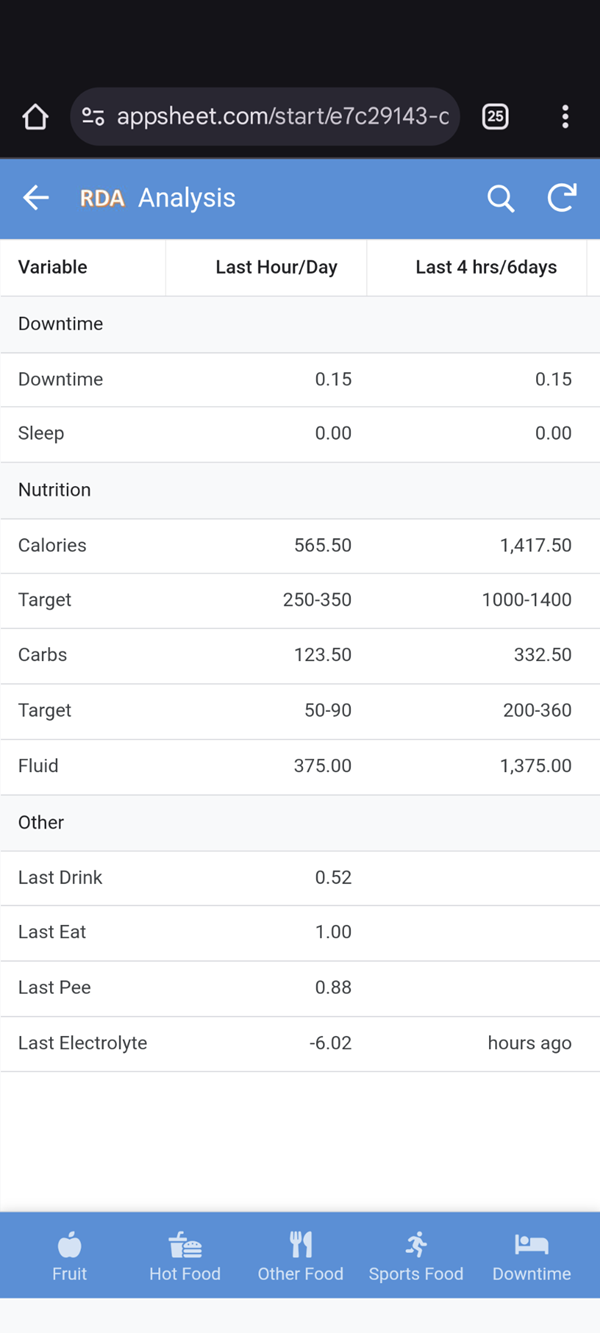
I also took an electrolyte tablet (to keep the salt in my body) at 5 ½ hours, 7 hours when I was feeling a bit of cramp in my left calf muscle, and 14 ½ hours. I have taken electrolytes in the past but probably not in that quantity, but they shouldn’t be causing the problems I was experiencing.
I had consumed 6 litres of fluid in the first 16 hours of the race. Just over half of that was carb drinks and half was straight water. It had been relatively warm during the day and with my average sweat rate (something else that I’ve been measuring during training this year) being about 500 ml’s per hour at 8:15 to 8:30/km pace, 6 litres in 16 hours was probably about right.
I was drinking the carb drinks to plan and topping up with water when feeling thirsty. My carb drinks were all mixed at a ratio of 25 grams of carbs to 125 mls of water which is double the concentration recommended by Tailwind and SiS (the two carb drinks I was consuming). I was achieving this my adding an equal quantity of straight maltodextrin to my drinks (or at least Sarah was when mixing the drinks), and some drinks were just straight maltodextrin. Maltodextrin is something I have been experimenting with since May/June. It is relatively flavourless which is how I can tolerate the flavour of the increased carb concentration of Tailwind and SiS. I was also drinking from 125ml bottles, making it easy to record the quantity I was drinking and also meaning that I could quickly drink the volume I needed and then carry an empty bottle for the remainder of the lap rather than a half full, or three quarter full bottle.
I’ve been working with a sports nutritionist in recent months and will need to discuss this review of my nutrition with him to work out what our next steps are.
I knew that Sarah would be arriving back at the track at around 6:30am (20 ½ hours) and would be bringing me a cheese jacket potato. I had planned this to be my first deviation from my 100% carb diet, and I was now counting down the minutes until she arrived.
Looking at my lap times, I see that my average lap time between 2am (16 hours) and 6:30am when Sarah arrived had slipped to 9:57.
When I created the app for recording my food and drink intake and my downtime, I also thought it could be useful to record my level of mental positivity every time I recorded either food intake or downtime, and while my memory of the race tells me that I felt like I was suffering from 16 hours, it wasn’t until 7:30am (21 ½ hours) that I actually recorded anything other than 5 out of 5 as my mindset. So I guess I was still feeling reasonably positive through these stages.
My intention is to further develop the app so that when we go to Vallon next year for the six day race, Sarah has full access to my data and can see what I’ve been eating and drinking as well as my mindset, and can make nutrition decisions accordingly. In my prototype, all she could see was my a Google spreadsheet containing similar information to the above screenshot.
At 6am (18 hours) I was over 3 laps ahead of Alain, with another 3 laps back to Olivier, and I guess this knowledge was keeping me positive.
After the potato at 6:30am I quickly transitioned to real foods, which have been what I’ve eaten in all races up until this year. I was still eating every 20 minutes, but the problem with real food is that there is a lot of ‘overhead’ and the carb to calorie and carb to volume ratios are much lower. This makes it difficult to consume as many carbs per hour compared to consuming sports drinks and chews.
Over the next 12 hours I only consumed 600 grams of carbs (50 grams per hour versus 75 for the first 18 hours) and 2,800 calories (233 calories per hour versus 300 calories in the first 18 hours).
The 12 hour race started at 8:30am and the 24 hour race started at 10am. In between the start of those two races I passed 100 miles – about 22 hours 58 minutes. I completed that lap at 23 hours and 17 seconds with total mileage of 161.101km. I calculated that even with some sleep and continued slowdown, 300km was highly possible – 139km to go.
My 24 hour distance was 167km. 133km to go to get to 300km.
My plan was to have a one hour sleep at 25 hours (11am) once the noise around the start of those two shorter races had died down. I thought the dormitory areas would be relatively empty and quiet. I was wrong!
Because I was feeling tired and struggling, I decided to bring me sleep break forward 30 minutes but the noise in the dormitory area was too much. I tried to sleep but after 30 minutes I decided to get moving again.
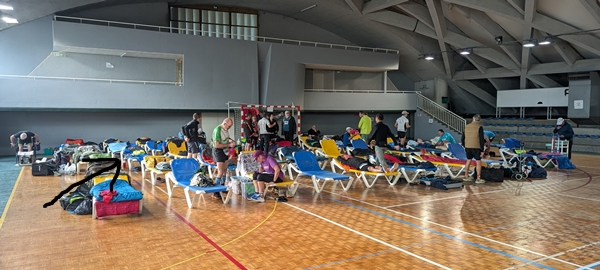
At 24 hours I had a big lead – 6 laps ahead of Alain with a further 4 laps back to Olivier. I didn’t want to waste that lead if I was unable to sleep. I didn’t know whether my lead was because I was walking faster than these two, or whether they had both had sleeps already. Looking at their lap times post-race I see that Alain didn’t have his first rest until 35 hours (35 minutes), and he also had just under an hour at both 39 and 41 hours.
Olivier has already taken two 30 minute breaks (at 10 and 21 hours), and would take six more breaks of between 30 minutes and 1 ¾ hours during the remainder of the race.
After Alain, Olivier and myself, there was a huge gap back to 4th place.
After my aborted attempt at sleep I walked another three hours but at a slow average lap pace of 12:14. I covered just under 17km. At the end of the lap I decided I needed a rest and sat down in the chair beside the table containing my food and drink. I think Sarah must have been there and we decided I should try and have another sleep, but again I found the dormitory too loud to sleep and after less than 30 minutes I was back out on the track.
I was still leading but the gap was now only 2 laps back to Alain and another 3 laps to Olivier. It was 3pm, 29 hours into the race.
Two hours later, at 5pm, Olivier had caught Alain and they were both just 200 metres behind me!
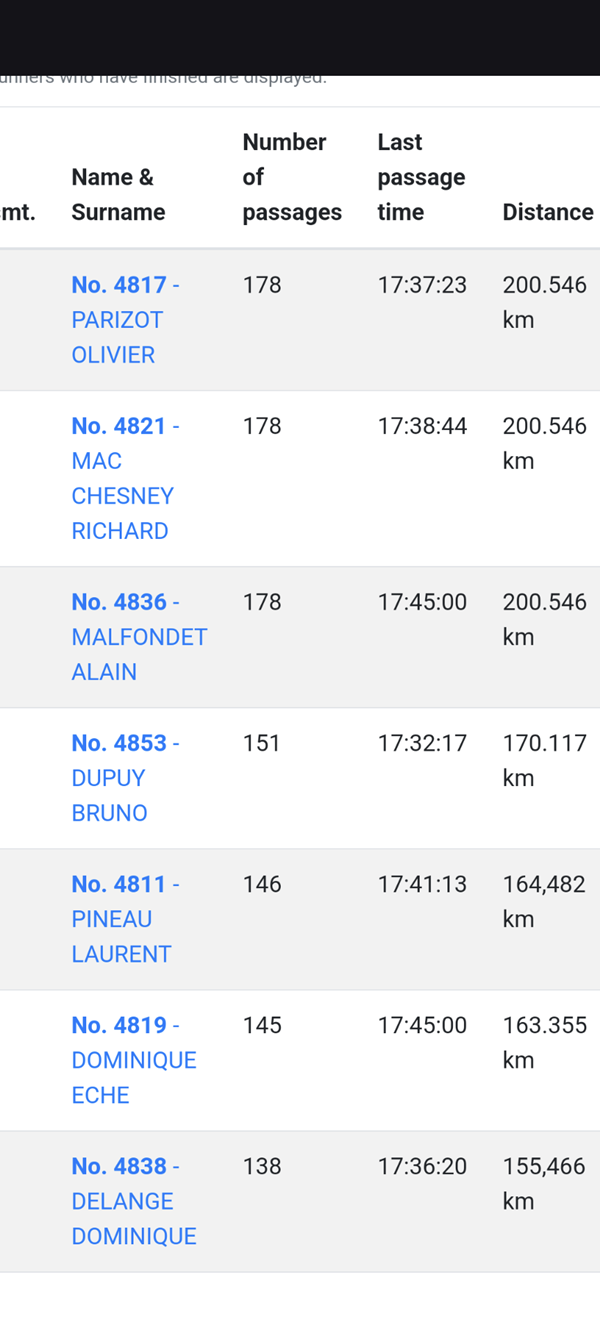
And a couple laps later, at exactly 200km Olivier passed me. Alain had taken a short break but we were all on the same lap.
I was really struggling, averaging 14 ½ minutes per lap. I wasn’t fully aware of what was going on but I see from the lap times that at 220km, 35 hours 50 minutes, just before 10pm, I was still in second place – 36 minutes behind Olivier and 22 minutes ahead of Alain.
I don’t actually fully remember the next few hours. I remember discussing with Sarah and telling her that I would have a sleep and she could go back to the AirBnB but my lap times show that I was off the track for about 1 hour and 35 minutes and then walked another two laps before taking a longer sleep of almost 4 ½ hours – including some foot maintenance before going back on to the track. It had started raining too.
I’m not sure whether I sent Sarah back to the AirBnB at 10pm or when I had my second sleep. I stopped recording my food and drink consumption as well as downtime at 10pm, and have no memory of having two sleeps with two laps in between.
I do remember using the rain as an excuse for a long sleep and hearing the rain on the roof of the gym/dormitory. It must have been heavy.
I also remember that I slept well and when I woke up at 4:30am I went and had a look outside hoping that it was still raining, and I could go back to bed.
The rain had stopped however, and I knew that I would be disappointed in myself if I didn’t get out there and try to walk as many laps as I could in the remaining 5 ½ hours.
I spent a few minutes draining a couple small blisters, taping my feet, and putting some clean socks on, and then I headed back on to the track.
I was now in 3rd place but 18km behind Alain and 16km behind Olivier. I was well clear of 4th place though. At the completion of my first lap I had just under 5 hours to go and had completed 226km. Disappointing, but potentially I could still make 250km or more.
I walked three laps in the next 45 minutes, feeling reasonable, but then I ran out of energy again. It was only 6am, still dark, and I found it easy to sit down for a few minutes rest at the end of each lap. I was really just going through the motions and not walking with any positivity at all.
My laps were now averaging 20 minutes and I started feeling like the world was against me. Why was it still dark? It should be daylight by now (or at least that is what I thought).
I messaged Sarah asking her to cook an omelette for me when she woke up, and less than an hour later she arrived with an omelette in a tinfoil dish wrapped in more tinfoil to keep it warm.
I continued to struggle though until 8:30am, averaging 20 minutes per lap including a rest at the end of each lap. But with 90 minutes to go something changed in my head and I started picking up the pace without increasing my effort, and I wasn’t needing a rest at the end of each lap either.
My next lap was 14:20 followed by a couple high 13 minute laps, and then I was walking 12 minute laps and my last complete lap was 12:01. My brain had registered to the fact that the race was almost over and whilst I was still walking relatively slowly, I was walking significantly faster than I had during the previous 3 or 4 hours.
On completion of my last full lap I still had 7 minutes in which I walked another 750 metres – 10 ½ minute lap pace. I was finally feeling good again, but too late.
I finished with a total distance of just 246.378km. 8km behind Olivier and 14km behind race winner, Alain. Even with my miserably slow pace between 5am and 8:30am, I still managed to pick up a couple kilometres on the two leaders, but overall I was just glad the race was over. And it appears that Olivier had a rest between 44 and 46 hours knowing that he had done enough to finish in front of me.
I was also glad to have both Sarah and Kathy who could gather my things from the Marquee because I headed straight to the gym/dormitory and lay on my camp bed for the hour or so until the awards ceremony. I wasn’t going to walk any further than I had to.
Post race analysis:
Full race results can be accessed here and my lap times are available from the race timer’s website (select 48 hour walk and click on my name).
I’ve graphed the distance that each of the three of us (Alain, Olivier and myself) were on at the completion of each 30 minutes throughout the race.
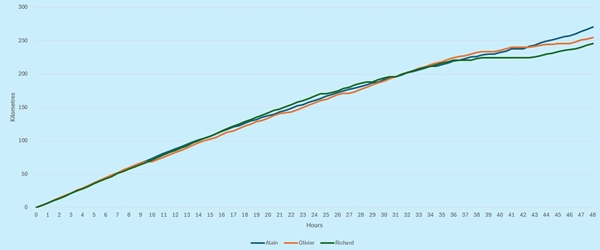
All three of us were relatively steady for the first 24 hours. Alain was the most consistent throughout the race, and he had the least amount of rest of the three of us – one 30 minute break and two breaks of around 45 to 55 minutes. That was similar to my original race plan, but it was Alain that was able to execute on the day/s, and he was a deserved winner.
I stopped recording my food and drink consumption and my downtime after 36 hours, but I do have concerns that maybe my race performance was impacted by taking on too much sugar (carbs). In the first 36 hours I consumed 9,500 calories (263 per hour) and 2,200 grams of carbohydrate (61 grams per hour). I also drank a total of 10.625 litres of fluid, and had 27 toilet stops with 15 of those being in the last 12 hours! That’s roughly 30 minutes lost with toilet stops and because of my concerns that I couldn’t complete a full lap without needing a wee, I also had another 4 unproductive visits to the toilet between 6:30 and 8:30pm on the Saturday night – another 10 minutes lost.
I need to get this sorted. Do I revert back to my old nutrition plan – which was eat real food and drink water plus occasional Coke but with no real plan of how much or how often I ate and drank? I don’t know.
I’ve also invested in a Continuous Glucose Monitor (doesn’t actually cost that much, especially when importing direct from China on Ali Express) which I’m going to use firstly during the next few weeks while I’m not training to get a blood/glucose benchmark and identify what foods do and don’t cause my blood sugar to spike. And then when I resume training and start doing longer walks again, I’ll monitor what happens when I’m consuming carbohydrates in both in the form of sports drinks and chews and also real food and hopefully identify what does and doesn’t work for me.
Also, if I decide that the Continuous Glucose Monitor is worth wearing during races, Sarah will be able to monitor my blood sugar levels live via the app’s website and use what she sees combined with what she sees from my Google app to decide what I need to eat/drink. A much more scientific approach to what we have done in the past.
I still think that 500 miles in six days is a possibility, but to achieve that I need everything to go perfectly in Vallon next April/May (race starts on 28th April) – no injuries like this year, and no nutrition problems.
Photos:
Some more photos:
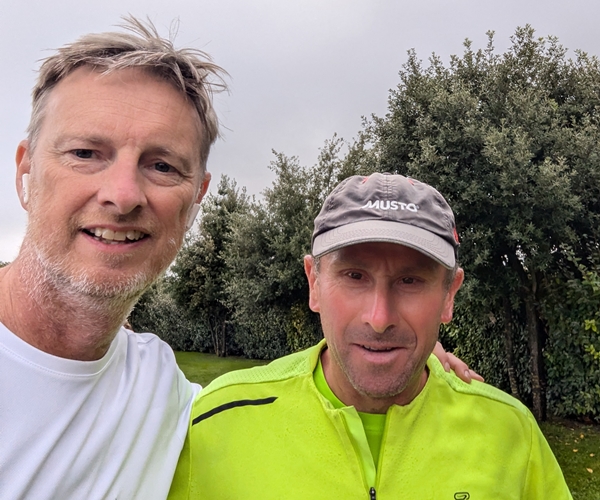
Not everyone takes the race seriously:
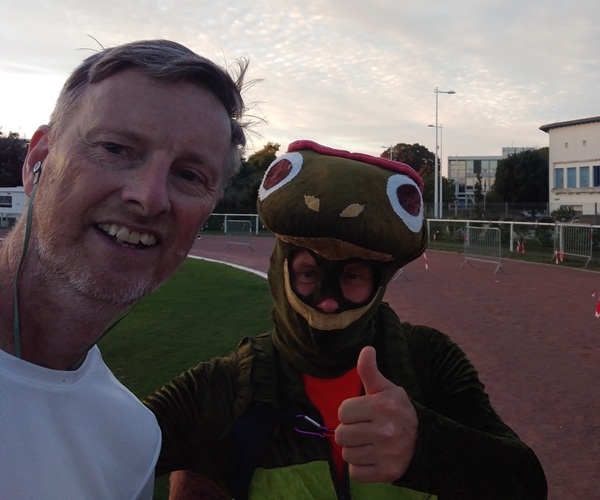
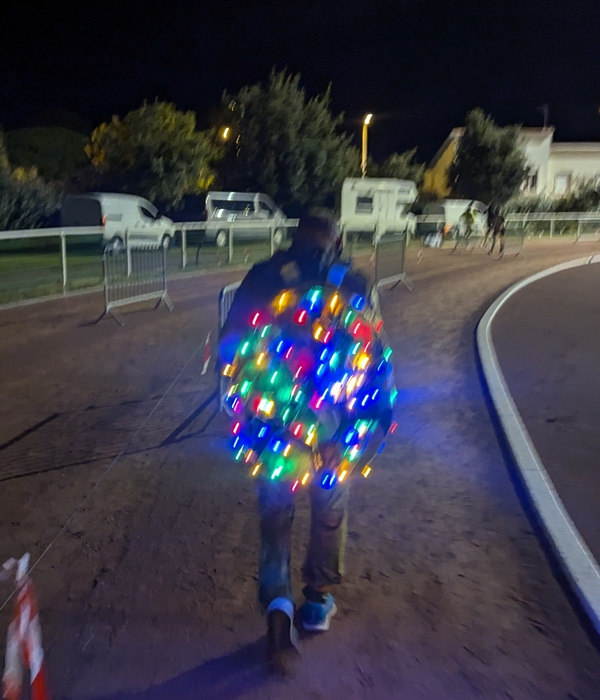
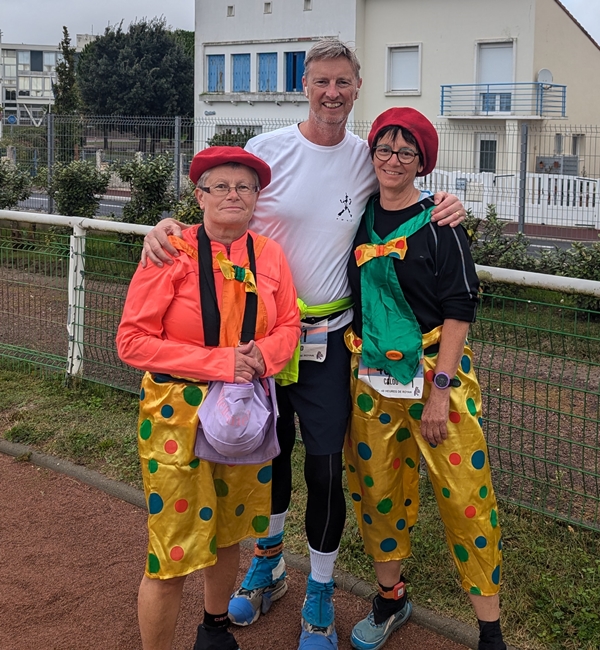
And lastly, the podium:
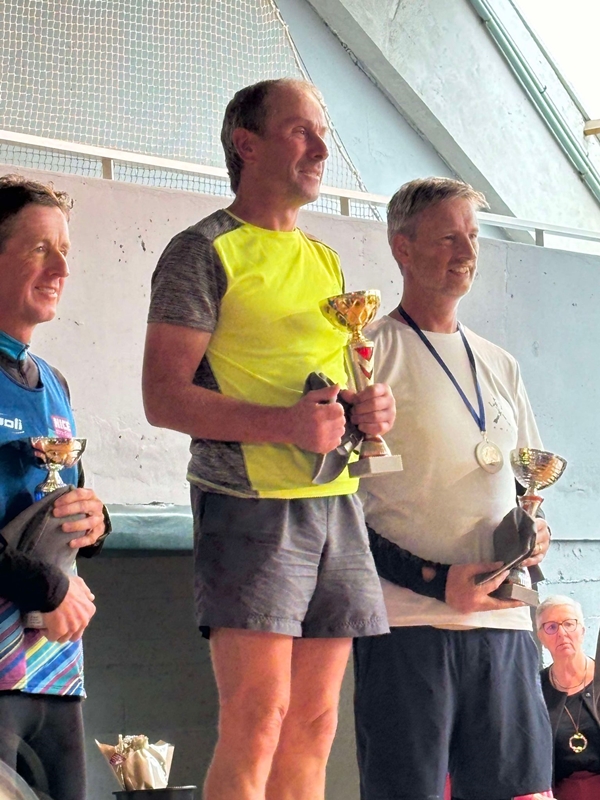
As always and excellent report. It will be interesting what you learn from the continuous glucose meter. With the right combination of sleep and fueling. 500 miles in 6 days is possible.
Thanks Ed
Training will start properly in January. At the moment I’m on 100% rest, probably until the end of November. Getting over some minor injuries and enjoying being able to sleep in.
A s i read through that I thought you were taking in way too much sugar. But I am not a multiday expert like you are…
I have never used a gel, On Comrades I prefer mixing drinks , so will drink energade , creme soda and 0% beer as and when I feel like- I cannot drink coke. I genuinely try to not pee as I believe then you are over hydrated so just hold back on drinking for a table or 2. I also believe that carbs give me an upset stomach. I believe some protein is good , like the omelete idea. I wonder if your sugar levels were not way too high, the continuous glucose monitor will help with this..
I do eat energy bars like granola etc. I normally have biltong , crystalized ginger ( great palate clensor) , nuts etc.
I do believe we are all different and need to find what works for us.
Thanks Dave
I agree. We are all different and therefore everything we do is an experiment. I’m hoping that the Continuous Glucose Monitor will help me sort things out.
Sleeping in noisy environments and that feeling of wasting my time is something I’ve struggled with in races. I now sleep with soft, silicone ear plugs and an eye mask and they will be a part of my “sleeping kit” for my next race. I’ve even been practicing afternoon naps on Saturday’s, after my long run, to get my brain used to the idea. It seems to be working. To start, I would lie there for an hour and maybe drift in and out of sleep for a total of 10/15 minutes. Now I fall asleep quickly and get a solid 35-45 minutes sleep in one go.
Thanks James
I was using an eye mask but I haven’t managed to find ear plugs that work for me. If I do this race again, I’m thinking of buying some big overhead noise cancelling headphones.